unit6知识点
初中英语人教新目标九年级全一册unit6知识点
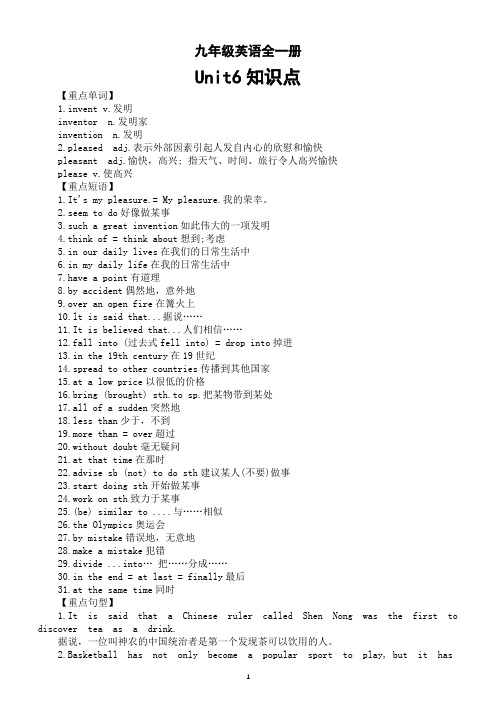
九年级英语全一册Unit6知识点【重点单词】1.invent v.发明inventor n.发明家invention n.发明2.pleased adj.表示外部因素引起人发自内心的欣慰和愉快pleasant adj.愉快,高兴; 指天气、时间、旅行令人高兴愉快please v.使高兴【重点短语】1.It's my pleasure.= My pleasure.我的荣幸。
2.seem to do好像做某事3.such a great invention如此伟大的一项发明4.think of = think about想到;考虑5.in our daily lives在我们的日常生活中6.in my daily life在我的日常生活中7.have a point有道理8.by accident偶然地,意外地9.over an open fire在篝火上10.lt is said that...据说……11.It is believed that...人们相信……12.fall into (过去式fell into) = drop into掉进13.in the 19th century在19世纪14.spread to other countries传播到其他国家15.at a low price以很低的价格16.bring (brought) sth.to sp.把某物带到某处17.all of a sudden突然地18.less than少于,不到19.more than = over超过20.without doubt毫无疑问21.at that time在那时22.advise sb (not) to do sth建议某人(不要)做事23.start doing sth开始做某事24.work on sth致力于某事25.(be) similar to ....与……相似26.the Olympics奥运会27.by mistake错误地,无意地28.make a mistake犯错29.divide ...into…把……分成……30.in the end = at last = finally最后31.at the same time同时【重点句型】1.It is said that a Chinese ruler called Shen Nong was the first to discover tea as a drink.据说,一位叫神农的中国统治者是第一个发现茶可以饮用的人。
人教版九年级全一册英语Unit6重点语法知识点总结

人教版九年级全一册英语Unit6重点语法知识点总结Unit 6 When was it invented?Section A(1a~2d)_必记单词ⅢⅢ1. heel n.鞋跟;足跟【例句】His heel is raw because his shoe does not fit well. 因鞋子不合适,他的脚后跟擦破皮了。
2. scoop n. 勺;铲子【例句】He used a scoop to scrve the ice cream. 他用铲子来吃冰激凌。
3. electricity n.电;电能【例句】While I was cooking supper, the electricity went off.我正在做晚饭时停电了。
【联想】electrical adj.电的,与电有关的4. style n.样式;款式【例句】The style of this skirt is just in season.这条裙子的款式正当时令。
【搭配】out of style 过时的|| in style 流行;时髦地5. project n.项目;工程【例句】The project is proceeding as planned. 工程正在按计划进行。
【联想】projection n.设计;规划;放映6. pleasure n.高兴;愉快【例句】He didn't show any pleasure when I offered to go withhim.我提出和他一起去,他并没有表示出高兴的样子。
【搭配】pleasure in... 以……为荣‖with pleasure 乐意效劳It's a /my pleasure.不客气。
【注意】pleasure 多用作不可数名词,当做“快乐的事,乐事”解时用作可数名词。
7. zipper n.(=zip) 拉链;拉【例句】The zipper is red.这条拉链是红色的。
八年级英语上册“Unit 6”必背知识点

八年级英语上册Unit 6 I'm going to study computer science.必背知识点一、重点短语1. grow up:成长;长大2. every day:每天3. be sure about:对……有把握4. make sure:确信;务必5. send…to…:把……送到……6. be able to:能;能够7. the meaning of:……的意思/含义8. write down:写下;记下9. different kinds of:不同种类的10. hardly ever:几乎不;很少11. have to do with:与……有关系12. take up:开始从事;着手处理;接受13. too…to…:太……而不能……14. be going to + 动词原形:打算做某事15. practice doing:练习做某事16. keep on doing sth.:不断地做某事17. learn to do sth.:学会做某事18. finish doing sth.:做完某事19. promise to do sth.:许诺去做某事20. help sb. to do sth.:帮助某人做某事21. remember to do sth.:记住做某事22. agree to do sth.:同意做某事23. love to do sth.:喜爱做某事24. want to do sth.:想要做某事二、重点句型1. What do you want to be/ become when you grow up? 当你长大的时候想当什么?2. I want to be a/an…(如:computer programmer, doctor, engineer等):我想当……3. My parents want me to be a doctor, but I’m not sure about that. 我的双亲想要我当医生,但我还不确定。
八年级上册英语译林版u6知识点

八年级上册英语译林版u6知识点第一部分:词汇1. 动词词组在Unit 6中,有许多动词词组需要我们掌握,例如:1)pick up:拾起;接人;用某种方式获得例句:She picked up the book and started reading.2)put away:收起;放好例句:Please put away your toys before you go out to play.3)look forward to:期待例句:I'm looking forward to hearing from you soon.4)turn on / off:打开 / 关闭例句:Please turn off the lights before you leave the room.5)get together:聚会例句:Let's get together and have a party this weekend.2. 介词短语在Unit 6中,介词短语也是很重要的一部分,我们需要掌握一些基本的介词及其用法,例如:1)on:在某个表面上例句:There is a pencil on the desk.2)in:在某个空间内例句:My cat is sleeping in the basket.3)at:在某个地方例句:I will meet you at the bus station at 3 o'clock.4)to:表示方向例句:I'm going to the supermarket to buy some food.5)from:表示源头例句:I received a gift from my aunt yesterday.3. 名词词组在Unit 6中,还涉及到了一些常见的名词词组,例如:1)high school:高中例句:I will go to high school next year.2)middle school:中学例句:I'm studying in a middle school now.3)primary school:小学例句:He graduated from a primary school last year.4)weekend:周末例句:What are you going to do this weekend?5)birthday party:生日派对例句:We had a great time at my friend's birthday party last night.第二部分:句型1. 简单句在Unit 6中,我们需要掌握一些基本的简单句型,例如:1)主语 + 谓语例句:My mother is a teacher.2)主语 + 谓语 + 宾语例句:He likes playing basketball.3)主语 + 谓语 + 地址例句:I live in a big house.4)主语 + 谓语 + 宾语 + 地址例句:I bought a book in the bookstore.2. 复合句在Unit 6中,还涉及到了一些复合句型,例如:1)if 引导的条件句例句:If it rains tomorrow, we will stay at home.2)when 引导的时间状语从句例句:When the school bell rang, we all rushed into the classroom. 3)because 引导的原因状语从句例句:He was late for school because he missed the bus.4)where 引导的地点状语从句例句:I will meet you where we first met.第三部分:语法1. 一般现在时在Unit 6中,我们需要掌握一般现在时的用法,例如:1)表示习惯性、经常性的动作例句:I usually go to bed at 10 o'clock.2)表示客观事实例句:The earth goes around the sun.3)表示现在的状态例句:We are happy now.2. 一般过去时在Unit 6中,还需要掌握一般过去时的用法,例如:1)表示过去发生的动作例句:I went to the zoo last Sunday.2)表示过去的习惯性、经常性动作例句:He always came to school early when he was a student. 3)标志词过去时例如:yesterday, last week, two years ago 等例句:I watched a movie with my friends yesterday.第四部分:阅读和写作1. 阅读理解在Unit 6中,有一些阅读理解的练习,通过阅读课文,我们可以加深对词汇、句型和语法的理解,从而提高阅读理解的能力。
unit6知识点汇总

Unit 6 Keep our city clean知识点梳理一.单词keep 保持,维持clean干净的,整洁的make 使……变得dirty肮脏的museum博物馆ground地面,地上二.重点短语1.keep our city clean 保持我们的城市干净2.keep the air clean保持空气干净3.clean the desks and chairs擦桌子和椅子4.clean and beautiful干净且漂亮5.make the streets messy and dirty使街道变得杂乱肮脏6.make the air dirty使空气变脏7.many museums 许多博物馆8.on the ground 在地上1.black smoke from factories来自工厂的黑烟2.take the bus and the metro to school乘汽车和地铁去学校3.walk to school=go to school on foot步行去学校4.walk home 走回家5.pick up 捡起来6.fly away 飞走e back 回来8.move some factories away from our city将一些工厂搬离我们的城市9.plant more trees种更多的树10. sweep the floor扫地11. in the water 在水里12. on the floor 在地上13.after school 放学后14. two little black birds两只小黑鸟15. Well done.干得好。
16.like living in the city喜欢居住在城市17.like eating bananas喜欢吃香蕉18. throw a banana skin on the ground 扔一个香蕉皮在地上19. a banana skin一个香蕉皮20.throw rubbish on the floor把垃圾扔到地板上21.too late 太迟22.go to hospital去医院23.To keep the...clean,we can...要使......变干净,我们应该......四会:1.They help keep the air clean. 他们帮助保持空气干净。
Unit 6 知识点提要

8A Unit 6 知识点提要一、词汇1.观鸟不可n. *birdwatching观鸟(2种) go birdwatching= go to watch the birds2.市场可n. market (a/-s)在市场上at the market3.<口>是的yeah4.母鸡可n. hen (a/-s)5.<口>美味的,可口的adj. *yummy ▲比较级:yummier ▲最高级:the yummiest6.鹤可n. *crane (a/-s)7.丹顶鹤可n. *red-crowned crane (a/-s)8.麻雀可n. *sparrow (a/-s)9.天鹅可n. *swan (a/-s)10.鹰可n. *eagle ★(an/-s)11.羽毛可n. *feather (a/-s)12.宽的,宽大的adj. *broad 比较级:-er 最高级:the -est13.翅膀可n. wing (a/-s)14.种类可n. *type (a/-s)= kind= *sort★不同种类的... different types/ kinds of...★各种各样的... all types/ kinds of...15.罕见的,稀有的adj. *rare ▲比较级:-r ▲最高级:the -st16.大自然,自然界不可n. nature扎龙/盐城自然保护区Zhalong/Yancheng Nature Reserve17.自然的,天然的adj. natural18.(尤指为野生动物保存的)湿地可n. *wetland (a/-s)★世界上最重要的湿地之一one of the world’s most important wetlands19.提供v. pr o vide (give something to someone or something else)→三单:-s →▲过去式:-d →▲现分:providing主动提出,自愿给予v.8AU2offer(give something to someone)★★★为某人提供某物(4种)offer sth. to sb.= offer sb. sth.= provide sth. for sb.= provide sb. with sth.★给某人某物(2种)give sth. to sb.= give sb. sth.★给许多野生动物提供食物和庇护所(2种)provide food and cover for a lot of wildlife= provide a lot of wildlife with food and cover20.极好的,完美的adj. p er f e ct(the best)杰出的,极好的adj.8AU1excellent完美地adv. perfectly一个对一些稀有鸟类来说完美的地方 a perfect place for some rare birds★★★熟能生巧。
Unit-6-When-was-it-invented知识点讲解及练习
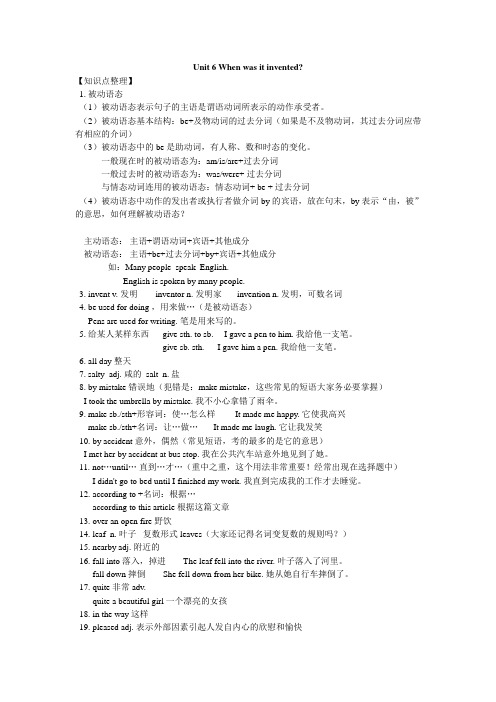
Unit 6 When was it invented?【知识点整理】1. 被动语态(1)被动语态表示句子的主语是谓语动词所表示的动作承受者。
(2)被动语态基本结构:be+及物动词的过去分词(如果是不及物动词,其过去分词应带有相应的介词)(3)被动语态中的be 是助动词,有人称、数和时态的变化。
一般现在时的被动语态为:am/is/are+过去分词一般过去时的被动语态为:was/were+ 过去分词与情态动词连用的被动语态:情态动词+ be + 过去分词(4)被动语态中动作的发出者或执行者做介词by的宾语,放在句末,by 表示“由,被”的意思,如何理解被动语态?主动语态:主语+谓语动词+宾语+其他成分被动语态:主语+be+过去分词+by+宾语+其他成分如:Many people speak English.English is spoken by many people.3. invent v. 发明 inventor n. 发明家 invention n. 发明,可数名词4. be used for doing ,用来做…(是被动语态)Pens are used for writing. 笔是用来写的。
5. 给某人某样东西 give sth. to sb. I gave a pen to him. 我给他一支笔。
give sb. sth. I gave him a pen. 我给他一支笔。
6. all day 整天7. salty adj. 咸的 salt n. 盐8. by mistake 错误地(犯错是:make mistake,这些常见的短语大家务必要掌握)I took the umbrella by mistake. 我不小心拿错了雨伞。
9. make sb./sth+形容词:使…怎么样 It made me happy. 它使我高兴make sb./sth+名词:让…做… It made me laugh. 它让我发笑10. by accident 意外,偶然(常见短语,考的最多的是它的意思)I met her by accident at bus stop. 我在公共汽车站意外地见到了她。
(完整版)Unit6 I’m going to study computer science 知识点、语法

Unit 6 I’m going to study computer science.一、新课标要求知识与技能:本单元的核心内容是“谈论未来活动”,通过本单元的学习,从听、说读、写四个方面掌握如何谈论将要做的事。
二、重点单词cook n.&v. doctor n. engineer n.violinist n. driver n. pilot n.pianist n. scientist n. college n.education n. medicine n. university n.London n. article n. send v.三、重要短语at a university 在大学study hard努力学习take singing /acting lessons 上唱歌/表演课move to a place搬去某地send sth to…把某物送到某地grow up成长;长大every day每天be sure about对……有把握make sure确信;务必be able to能the meaning of……的意思different kinds of不同种类的write down写下;记下have to do with关于;与……有关系take up开始做;学着做hardly ever几乎不;很少too…to…太……而不能……/太……以至于不能be going to+动词原形打算做某事practice doing练习做某事keep on doing sth.不断地做某事learn to do sth.学会做某事finish doing sth.做完某事promise to do sth.许诺去做某事help sb. to do sth.帮助某人做某事remember to do sth.记住做某事agree to do sth.同意做某事love to do sth.喜爱做某事want to do sth.想要做某事promise to do sth.承诺做某事make a promise许下承诺四、知识点解析be going to 的用法be going to + 动词原形——表示将来的打算、计划或安排。
Unit6知识点总结 人教版八年级英语下册
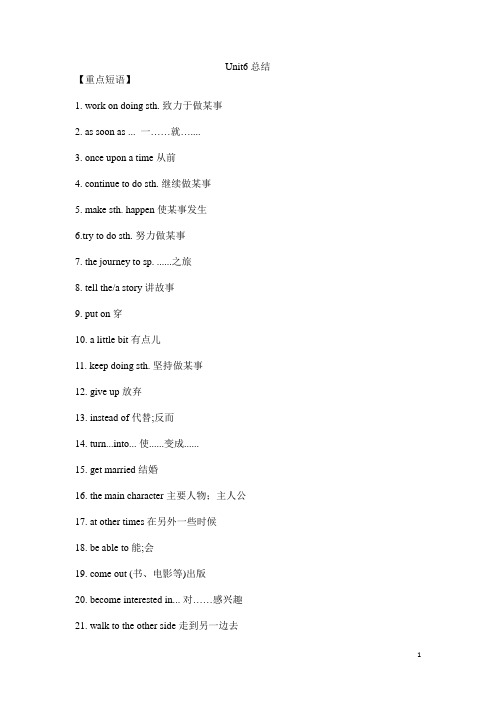
Unit6总结【重点短语】1. work on doing sth. 致力于做某事2. as soon as ... 一……就…....3. once upon a time 从前4. continue to do sth. 继续做某事5. make sth. happen 使某事发生6.try to do sth. 努力做某事7. the journey to sp. ......之旅8. tell the/a story 讲故事9. put on 穿10. a little bit 有点儿11. keep doing sth. 坚持做某事12. give up 放弃13. instead of 代替;反而14. turn...into... 使......变成......15. get married 结婚16. the main character 主要人物;主人公17. at other times 在另外一些时候18. be able to 能;会19. come out (书、电影等)出版20. become interested in... 对……感兴趣21. walk to the other side 走到另一边去22. a fairy tale 一个神话故事23. the rest of the story 故事的其余部分24. leave sb. to do sth. 让某人做某事25. make a plan to do sth. 筹划/计划做某事26. go to sleep 去睡觉27. lead sb. to sp. 把某人领到某地28. get lost 迷路29. change one’s plan 改变计划30. tell sb. to do sth. 叫某人做某事31. in the moonlight 在月光下32. find one’ s way home 找到某人回家的路33. the next day 第二天34. send sb. to sp. 派某人去某地35. so...that... 如此.......以致于.......【重点句型】1.So what do you think about the story of Yu Gong? 你觉得愚公的故事怎么样?2. It doesn't seem very possible to move a mountain. 把一座山给移掉好像不太可能。
人教版九年级英语全册Unit6知识点
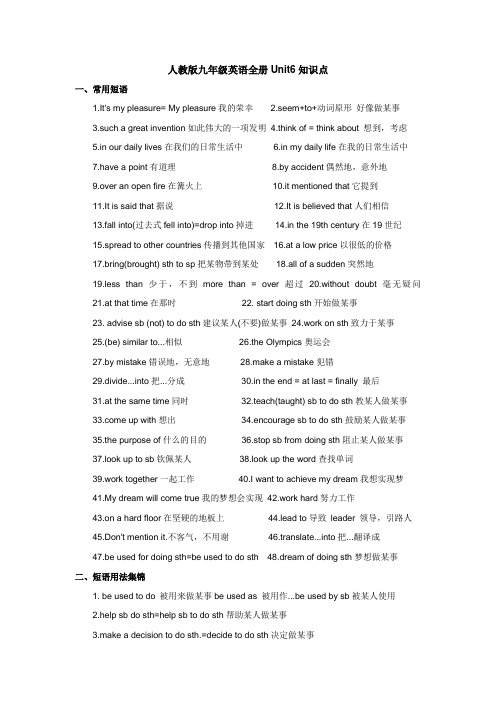
人教版九年级英语全册Unit6知识点一、常用短语1.It's my pleasure= My pleasure我的荣幸2.seem+to+动词原形好像做某事3.such a great invention如此伟大的一项发明4.think of = think about 想到,考虑5.in our daily lives在我们的日常生活中6.in my daily life在我的日常生活中7.have a point有道理8.by accident偶然地,意外地9.over an open fire在篝火上10.it mentioned that它提到11.It is said that据说12.It is believed that人们相信13.fall into(过去式fell into)=drop into掉进14.in the 19th century在19世纪15.spread to other countries传播到其他国家16.at a low price以很低的价格17.bring(brought) sth to sp把某物带到某处18.all of a sudden突然地19.less than少于,不到more than = over 超过20.without doubt毫无疑问21.at that time在那时22. start doing sth开始做某事23. advise sb (not) to do sth建议某人(不要)做某事24.work on sth致力于某事25.(be) similar to...相似26.the Olympics奥运会27.by mistake错误地,无意地28.make a mistake犯错29.divide...into把...分成30.in the end = at last = finally 最后31.at the same time同时32.teach(taught) sb to do sth教某人做某事e up with想出34.encourage sb to do sth鼓励某人做某事35.the purpose of什么的目的36.stop sb from doing sth阻止某人做某事37.look up to sb钦佩某人38.look up the word查找单词39.work together一起工作40.I want to achieve my dream我想实现梦41.My dream will come true我的梦想会实现42.work hard努力工作43.on a hard floor在坚硬的地板上44.lead to导致leader 领导,引路人45.Don't mention it.不客气,不用谢46.translate...into把...翻译成47.be used for doing sth=be used to do sth 48.dream of doing sth梦想做某事二、短语用法集锦1. be used to do 被用来做某事be used as 被用作...be used by sb被某人使用2.help sb do sth=help sb to do sth帮助某人做某事3.make a decision to do sth.=decide to do sth决定做某事4.make sb + adj使某人怎么样make sb do sth使某人做某事be made to do sth被使唤去做某5..in this way这样,用这种方式三、重点语法1.some time 一段时间sometimes 有时some times几次sometime 某个时候2.one of the world's favorite drinks世界最受欢迎的饮料之一.one of 什么之一,后面的名词用复数(一般要加S),动词用单数(一般要加S);favorite,最喜欢的,前面要用“谁的”.3.thousand千hundred百million百万,当它们前面有数字的时候,它们本身不能加S,当它们后面有of的时候它们要加S,但前面的数字和后面的of不能同时存在4.not…until直到…才,I don‘t go to sleep until 11 every day.我每天直到11点才睡觉。
unit-6-I’m-going-to-study-computer-science知识点总结

Unit6I’m going to study computer science一、词性转换1.violin名词(表人)violinist小提琴家2.piano名词(表人)pianist钢琴家3.science名词(表人)scientist科学家4.drive名词(表人)driver司机cation形容词educational有教育意义的6.send过去分词sent7.foreign名词(表人)foreigner8.mean名词meaning9.discuss名词discussion10.begin名词beginning重点讲解:puter programmer bus driver basketball player【拓展】(1)动词后加erlisten→listener听众read→reader读者teach→teacher教师clean→cleaner清洁工sing→singer歌手work→worker工人farm→farmer农夫own→owner主人play→player运动员wait→waiter服务员(2)以e结尾的加rwrite→writer作家dance→dancer舞蹈演员drive→driver驾驶员(3)在动词后加orvisit→visitor参观者invent→inventor发明者act→actor男演员2.violin→violinist;Piano n→pianist【拓展】 -ist是一个名词后缀,加在某些名词或动词后面,可用来表示“从事某种职业的人“piano→pianist science→scientist art→artist艺术家3.I’m going to move to Shanghai.。
【解析】move v移动,搬动move to+地点搬到某地A.pianoB.driverC.pilotD.scientist3.I’m going to move to Shanghai.。
八年级上册英语unit6知识点总结

八年级上册英语unit6知识点总结Unit 6是八年级上册英语的重要模块,本篇文章旨在对其知识点进行系统总结,帮助同学们快速复习和提高英语水平。
以下为详细内容:I. Word and phrase study1. VocabularyUnit 6中的常用词汇包括:1) Nationality: American, Canadian, Chinese, English, French等,分别表示国籍。
2) Family members: father, mother, daughter, son, brother, sister等,表示家庭成员。
3) Adjectives: kind, friendly, creative, adventurous等,表示人的性格特征。
4) Food: Chinese food, Italian food, noodles, rice等,表示食物种类。
5) Activities: play basketball, take pictures, watch TV等,表示活动内容。
2. Phrases常用短语包括:1) On the weekend: 表示周末的时间短语,通常接动词原形。
2) With the help of: 表示在某人帮助下做某事的短语,后接人名或代词。
3) Be good at: 表示擅长某项事物,后接名词或动词-ing形式。
4) Keep doing: 表示持续不断地做某事。
5) Go on vacation: 表示去度假的短语,常用在谈论旅游方面。
II. Grammar1. Simple present tense1) 表示客观的事实或真理的时候,如“地球是圆的”,使用一般现在时态。
2) 表示习惯性的动作,如“每天早上我都喝咖啡”,也使用一般现在时态。
3) 表示永久性或长期性的状态,如“我爱你”,使用一般现在时态。
2. Present continuous tense1) 表示正在进行的动作,如“我正在学英语”,使用现在进行时态。
人教版九年级英语unit6知识点总结
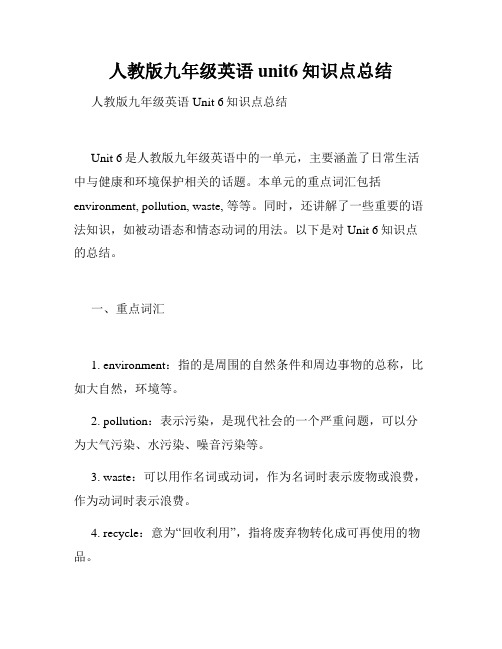
人教版九年级英语unit6知识点总结人教版九年级英语Unit 6知识点总结Unit 6是人教版九年级英语中的一单元,主要涵盖了日常生活中与健康和环境保护相关的话题。
本单元的重点词汇包括environment, pollution, waste, 等等。
同时,还讲解了一些重要的语法知识,如被动语态和情态动词的用法。
以下是对Unit 6知识点的总结。
一、重点词汇1. environment:指的是周围的自然条件和周边事物的总称,比如大自然,环境等。
2. pollution:表示污染,是现代社会的一个严重问题,可以分为大气污染、水污染、噪音污染等。
3. waste:可以用作名词或动词,作为名词时表示废物或浪费,作为动词时表示浪费。
4. recycle:意为“回收利用”,指将废弃物转化成可再使用的物品。
5. protect:表示保护,指采取措施,预防破坏或危害。
6. global:意为“全球的”,用来描述事情或现象具有全球性的范围和影响。
7. vehicle:表示车辆,可用来指代各种交通工具,如汽车、火车等。
二、重要句型和语法知识1. 被动语态(Passive Voice)被动语态是英语中重要的语法结构之一,使用形式为“助动词be + 及物动词的过去分词”。
例如:- The book was written by him.(这本书是他写的。
)被动语态常用于以下情况:- 强调动作的接受者(宾语)而不是执行动作的人(主语)。
- 主语未知或不重要。
- 特定情境下。
2. 情态动词(Modal Verbs)情态动词用来表示情态、可能性、建议、允许等。
常见的情态动词有can, could, may, might, should, must, ought to等。
例如:- You should recycle the plastic bottles.(你应该回收塑料瓶。
)3. 祈使句(Imperatives)祈使句是用来发出命令、请求、建议等的句子。
人教版九年级全一册英语Unit6单元语法知识点总结
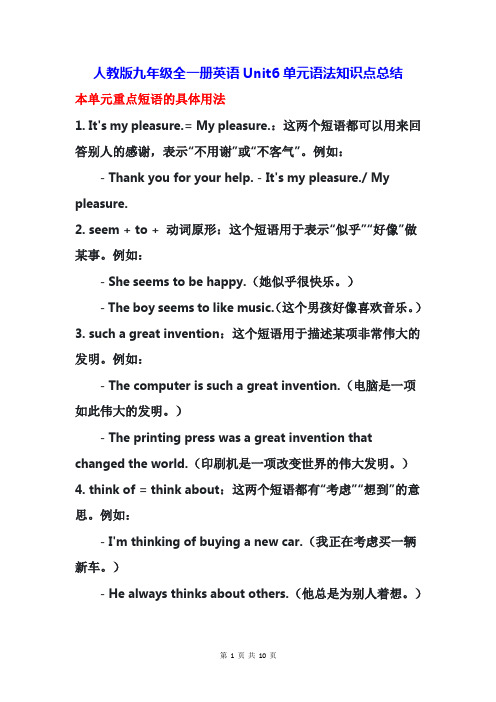
人教版九年级全一册英语Unit6单元语法知识点总结本单元重点短语的具体用法1. It's my pleasure.= My pleasure.:这两个短语都可以用来回答别人的感谢,表示“不用谢”或“不客气”。
例如:- Thank you for your help. - It's my pleasure./ My pleasure.2. seem + to + 动词原形:这个短语用于表示“似乎”“好像”做某事。
例如:- She seems to be happy.(她似乎很快乐。
)- The boy seems to like music.(这个男孩好像喜欢音乐。
)3. such a great invention:这个短语用于描述某项非常伟大的发明。
例如:- The computer is such a great invention.(电脑是一项如此伟大的发明。
)- The printing press was a great invention that changed the world.(印刷机是一项改变世界的伟大发明。
)4. think of = think about:这两个短语都有“考虑”“想到”的意思。
例如:- I'm thinking of buying a new car.(我正在考虑买一辆新车。
)- He always thinks about others.(他总是为别人着想。
)5. in our daily lives/ in my daily life:这两个短语用于描述在日常生活中的情况或活动。
例如:- Technology plays an important role in our daily lives.(科技在我们的日常生活中起着重要的作用。
)- In my daily life, I like to read books and exercise.(在我的日常生活中,我喜欢读书和锻炼。
人教版八年级英语上册-unit6-语法+知识点

Unit 6 I’m going to study computer science.否定结构:be not going to do / will not dozaq (won’t)will 与be going to两者都表示将来要做的动作,但还是有区别的。
一、be going to表示近期、眼下就要发生的事情,will表示的将来时间则较远一些。
如:We are going to take a walk tonight. I will visit you in a month.二、在表示将来发生的事情时,be going to用于主观判断,will则多用于客观的情况。
如:He is going to die. 他就要死了。
She will be thirteen years old. 他就快13岁了。
三、be going to含有“打算,准备”的意思,而will则没有这个意思,如:Tomorrow I am going to wake up at 7:00. Everyone will learn English.四、在有条件从句的主句中,主句中一般不用be going to, 而多用will.如:If he comes, I'll tell you. 如果他来了我会告诉你。
五、可表示说话人按照他的意图将要发生或进行的动作时,各有侧重:若事先计划或考虑,而是在说话的当时临时想到的意图或临时作出的决定时,则要用will。
若表示经过事先考虑好的意图时,要用be going to。
例如:I’ll answer the telephone.(事先没经过考虑)I’m going to meet him at the railway station. (已经过考虑)六、在正式的通知(如新闻媒体公布的官方消息,气象预报等)中用will。
例如:Ji’an will be cloudy with the temperature from eighteen to twenty-eight.(吉安阴,气温十八到二十八摄氏度。
仁爱英语七年级Unit-6-知识点归纳
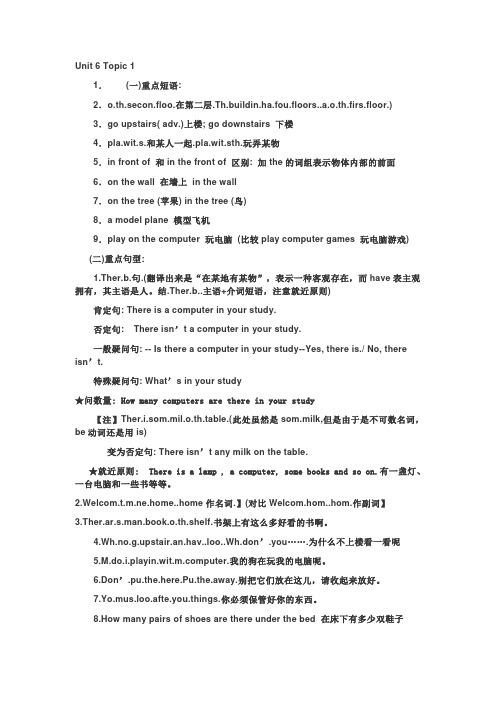
Unit 6 Topic 11.(一)重点短语:2.o.th.secon.floo.在第二层.Th.buildin.ha.fou.floors..a.o.th.firs.floor.)3.go upstairs( adv.)上楼; go downstairs 下楼4.pla.wit.s.和某人一起.pla.wit.sth.玩弄某物5.in front of 和in the front of 区别: 加the的词组表示物体内部的前面6.on the wall 在墙上in the wall7.on the tree (苹果) in the tree (鸟)8.a model plane 模型飞机9.play on the computer 玩电脑(比较play computer games 玩电脑游戏)(二)重点句型:1.Ther.b.句.(翻译出来是“在某地有某物”,表示一种客观存在,而have表主观拥有,其主语是人。
结.Ther.b..主语+介词短语,注意就近原则)肯定句: There is a computer in your study.否定句: There isn’t a computer in your study.一般疑问句: -- Is there a computer in your study--Yes, there is./ No, there isn’t.特殊疑问句: What’s in your study★问数量: How many computers are there in your study【注】.o.th.table.(此处虽然是k,但是由于是不可数名词,be动词还是用is)变为否定句: There isn’t any milk on the table.★就近原则: There is a lamp , a computer, some books and so on.有一盏灯、一台电脑和一些书等等。
Unit 6 知识清单(预习 复习 知识点详解)-牛津译林版九年级英语上册

9A Unit 6 TV programmes 知识清单一、Comic strip and Welcome to the unit.1.get bored with staying at home all day 整天呆在家变得无聊★get bored with doing sth. 做某事变得无聊2.have nothing to do 无事可做【拓展】It has nothing to do with you. 这件事情与你无关。
3.need a little sleep = need a bit of sleep 需要小睡一会4.A dog’s work is never done. 狗的工作是做不完的。
【被动语态】【拓展】well done! 干得好!5.learn a lot about nature and real-life events from documentaries从纪录片中了解许多关于自然和现实生活的事件6.win a big prize 赢得一个大奖7.There are always famous people on these shows talking about their lives.【There be sb. doing sth.】在这些访谈节目中总是有一些名人在谈论他们的生活。
8.There is not much dialogue in it. 【此句中dialogue不可数】【区分】(1) dialogue不可数名词,泛指一般意义上的对话。
(2) dialogue指具体的对话,会话,指两个人之间的对话,是可数名词。
9.The drama series is popular among young people. 【drama series 表示一部连续剧,谓语用单数】二、Reading1. Saturday’s TV programmes 周六的电视节目在时间后加’s ,相类似的有:today’s newspaper; tomorrow’s meeting2.a weekly round-up of what is happening in sport 一周体育界正在发生的事情的(新闻)摘要★weekly (adj.) 每周的;monthly (adj.) 每月的;yearly (adj.) 每年的3.up-to-date information =latest information 最新信息(2种)up-to-date 最新的=the latest =the newest, 其反义词是:out-of-date 过时的.★an up-to-date film 一部最新的电影4.The programme covers different sports. 本节目报道各种不同的体育动动消息。
Unit_6_I'm_watching_TV知识点总结
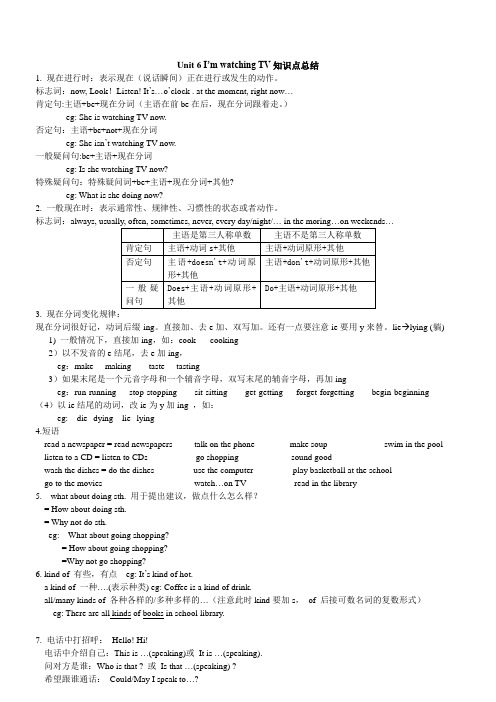
Unit 6 I’m watching TV知识点总结1. 现在进行时:表示现在(说话瞬间)正在进行或发生的动作。
标志词:now, Look!Listen! It’s…o’clock . at the moment, right now…肯定句:主语+be+现在分词(主语在前be在后,现在分词跟着走。
)eg: She is watching TV now.否定句:主语+be+not+现在分词eg: She isn’t watching TV now.一般疑问句:be+主语+现在分词eg: Is she watching TV now?特殊疑问句:特殊疑问词+be+主语+现在分词+其他?eg: What is she doing now?2. 一般现在时:表示通常性、规律性、习惯性的状态或者动作。
标志词:always, usually, often, sometimes, never, every day/night/… in the moring…on weekends…主语是第三人称单数主语不是第三人称单数肯定句主语+动词s+其他主语+动词原形+其他否定句主语+doesn't+动词原形+其他主语+don't+动词原形+其他一般疑问句Does+主语+动词原形+其他Do+主语+动词原形+其他3. 现在分词变化规律:现在分词很好记,动词后缀-ing。
直接加、去e加、双写加。
还有一点要注意ie要用y来替。
lie lying (躺)1) 一般情况下,直接加ing,如:cook-----cooking2)以不发音的e结尾,去e加ing,eg:make----making taste----tasting3)如果末尾是一个元音字母和一个辅音字母,双写末尾的辅音字母,再加ingeg:run-running stop-stopping sit-sitting get-getting forget-forgetting begin-beginning (4)以ie结尾的动词,改ie为y加ing ,如:eg: die--dying lie--lying4.短语read a newspaper = read newspapers talk on the phone make soup swim in the pool listen to a CD = listen to CDs go shopping sound goodwash the dishes = do the dishes use the computer play basketball at the schoolgo to the movies watch…on TV read in the library5. what about doing sth. 用于提出建议,做点什么怎么样?= How about doing sth.= Why not do sth.eg: What about going shopping?= How about going shopping?=Why not go shopping?6. kind of 有些,有点eg: It’s kind of hot.a kind of 一种….(表示种类) eg: Coffee is a kind of drink.all/many kinds of 各种各样的/多种多样的…(注意此时kind要加s,of 后接可数名词的复数形式)eg: There are all kinds of books in school library.7. 电话中打招呼:Hello! Hi!电话中介绍自己:This is …(speaking)或It is …(speaking).问对方是谁:Who is that ? 或Is that …(speaking) ?希望跟谁通话:Could/May I speak to…?8. Not much = Nothing much没忙什么9. join sb. for sth. 和某人一起做某事join sb. in doing sth.eg: He will join us for dinner.(他将和我们一起吃晚饭。
- 1、下载文档前请自行甄别文档内容的完整性,平台不提供额外的编辑、内容补充、找答案等附加服务。
- 2、"仅部分预览"的文档,不可在线预览部分如存在完整性等问题,可反馈申请退款(可完整预览的文档不适用该条件!)。
- 3、如文档侵犯您的权益,请联系客服反馈,我们会尽快为您处理(人工客服工作时间:9:00-18:30)。
Unit 6 An old man tried to move the mountains.How does the story begin?故事是怎么开始的?(询问故事的开端)Journey to the West西游记take a trip to Beijing北京之旅journey to sw某地之旅Yu Gong Moves a Mountain愚公移山move sth移动;挪到某物move to sw搬往某地moved 受感动的,修饰人moving 感动的;感人的,修饰物Hou Yi Shoots the Suns后羿射日shoot-shot射Nu Wa Repairs the Sky女娲补天repair sth=fix up sth=mend sth修理某物in my Chinese class在我的语文课上a famous story called Yu Gong Moves a Mountain.一个叫愚公移山的著名的故事called=named被叫做:被命名;called Yu Gong Moves a Mountain(修饰名词story)被叫愚公移山的once upon a time=long long ago=one day从前;很久以前two mountains near the house房子附近有两座山(介词短语后置修饰名词)It takes/ took/will take (sb)some time to do sth.做某事花费某人多长时间a long time 很长时间walk to the other side走到另一边walk to school步行去学校one side of the road马路的一边What happened next? 接下来发生了什么sth happened + to sb某人出了某事sth. + happened + 地点/时间(某地/某时发生了某事)The old man told his family that they should all help him to move the mountains.这位老人告诉他的家人,他们应该都帮助他一下tell-told告诉tell sb that+从句(告诉某人….)help sb( to) do sth告诉某人做某事A n old man probably couldn’t even move a small tree.一位老翁甚至不可能移走一棵小树probably=maybe或许;也许even甚至T hat’s what his wife said, too.那也是他妻子所说的what his wife said,(表语从句)Where would they put all the earth and stone from the mountains?他们要把山上所有的泥土和石头放在哪儿呢the stone from the mountains来自山上的石头(介词短语from…后置修饰名词stone)put sth+介词短语(将某物放在某处)put it into the sea把它倒(放)在海里The sea is big enough to hold everything. =The sea is so big that it can hold everything.海洋足够大,能容纳一切They all started digging the next day.他们第2天都开始挖山了All全都(三者以上)both全都(两者)all of…(….的全部)both of….(两者都)start doing sth=begin doing sth=start to do sth=begin to do sth开始做某事dig-dug-digging挖dig a hole挖坑begin to move some of the earth and stone to the sea 把一些泥土和石头移到海里dig the mountain挖山the next day第二天some of…..(….中的一些)Let me tell you the rest of the story about Yu Gong. 让我告诉你们关于愚公的剩下的故事吧let sb do sth让某人做某事the rest of…..(….的剩余)about sth有关某事They were working on moving the mountains.他们正在移山work on sth使用某物work on doing sth从事某事;做某事He could never move the mountains because he was old and weak.他绝不可能把山移走,因为他老了而且身体虚弱never从不;永远不be weak是虚弱的be weak in sth不擅长….be good at sth擅长…..His family would live and grow, but the mountains could not get bigger. ,他的家人会活着一代代繁衍,但是山不会变得更大get big变大Yu Gong kept on digging day after day and year after year.愚公日复一日年复一年的继续挖keep on doing sth继续做某事Finally, a god was so moved by Yu Gong that he sent two gods to take the mountains away.最后一位山神被愚公感动了,于是他派了两位神仙把山移走了.Finally=at last=in the end最后so….that….如此….以至于….send-sent送;寄;派send sb to do sth派遣某人做某事send sb to sw送某人去某地send sth to sb=send sb sth将某物寄给某人take sth away将某物带走:收起来This story reminds us that you can never know what’s possible unless you try to make it happen.这个故事告诉我们,除非你尽力去做一件事,否则你绝不会知道什么是可能的rem ind“提醒;使想起”remind sb. + that 从句“提醒某人……”remind sb. of sb./sth使某人回想起或意识到某人/某事remind sb. to do sth提醒某人去做某事be possible是可能的unless:“除非;如果不”引导条件状语从句,时态遵循“主将从现”原则。
unless引导条件状语从句时= if…not(同义句转换)make+名词+do sth(使….做某事)make+名词+adj( 使…..怎么样)make the stick small把金箍棒变小What do you think about the story of Yu Gong?你如何看待愚公这个故事think of=think about sth认为….the story….(….的故事)really interesting很有意思Yu Gong found a good way to solve his problem.愚公找到了一个解决他的问题的好办法find-found找到a way to do sth做某事的方法solve the problem解决问题solution(名词:解决)a little bit silly有点愚蠢a little bit= a little = a bit=kind of有点It doesn’t seem very possible to move a mountain.移山似乎是不可能的seem似乎;好像seem like sth似乎像…seem +名词(似乎是….)seem to do sth好像要做某事It seems + that+从句(似乎……)I seemed to hear a voice outside.=It seemed that I heard a voice outside. 我好像听见外边有说话声。
The story is trying to show us that anything is possible if you work hard!这个故事试图告诉我们的是,如果你努力工作凡事皆有可能try to do sth想方设法做某事try doing sth尝试做某事try to find other ways to solve a problem设法找到解决问题的其他办法来work hard努力工作Anything is possible.一切皆有可能give up sth放弃某事give up doing sth放弃做某事I still don’t agree with you. 我还是不同意你的观点agree with sb同意某人观点agree to do sth同意去做某事disagree不同意agreement(名词:同意)What could Yu Gong do instead of moving the mountains?愚公能做些什么代替移山呢?instead of 介词短语“代替;反而”instead of doing sth代替做某事”instead of sth代替某事”many other ways很多其他的办法for example比如build a road修路That’s better and faster than moving a mountain!那比移山要好得多,快得多。
You have different opinions about the story, and neither of you are wrong.关于这个故事你们有不同的观点,你们都没有错,have different opinions有不同观点in one’s opinion依某人来看;在某人看来neither(两者都不)反义词both(两者都)neither of….(….都不)There are many sides to a story and many ways to understand it.一个故事有许多面,有多种方法来理解它many sides很多方面two sides of the road马路两边many ways很多方法way道路on one’s way to sw在去…的路上on my way home在我回家的路上on his way to school在他上学的路上in November 1979在1979年11月in+年/月/年月;pupils in England= pupils from England英国的学生were able to watch a new TV program called Monkey 能够看一个叫美猴王的新电视节目be able to do sth=can do sth能够做某事watch a TV program看电视节目program called Monkey叫美猴王的节目most of them他们中的大部分hear this story听说这个故事hear sth听到某事for the first time第1次However, this story is not new to Chinese children.然而对于中国的孩子们来说,这个故事已不新鲜be new to sb/sth对某人是陌生的;对某物是新鲜的he main character主要人物in the traditional Chinese book 在中国传统著作中The Monkey King is not just any normal monkey.美猴王并不是任何一只普通的猴子normal平常的;普通的normally平常地(副词)just仅仅;只In fact, he sometimes does not even look like a monkey! 事实上他有时候甚至看起来不像一只猴子in fact事实上;实际上look like看起来像….This is because he can make 72 changes to his shape and size, turning himself into different animals and objects.正是因为它有72种外形和大小的变化能把自己变成不同的动物和物体This is because(because在这是表语从句)make changes发生变化(change名词)change (sth/sb)to/into…= t urn (sb. / sth.) into… 把……变成change(动词:变换)different objects不同的物体Unless he can hide his tail, he cannot turn himself into a man.除非他能能把自己的尾巴藏起来,否则他不能把自己变成人hide- hid隐藏;隐蔽hide sth from sb把某物藏起来不让某人发现hide from躲避;隐瞒His friends hid him from the bad guys.他的朋友把他藏了起来不让坏人发现。
